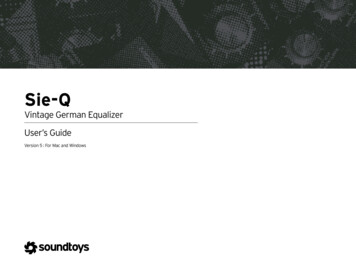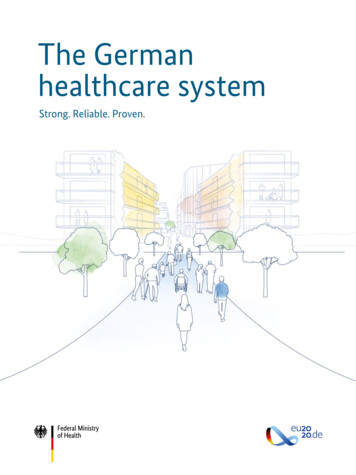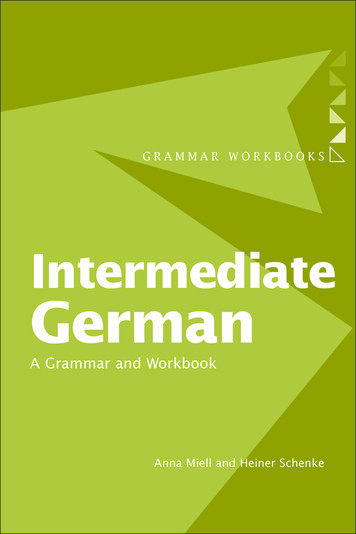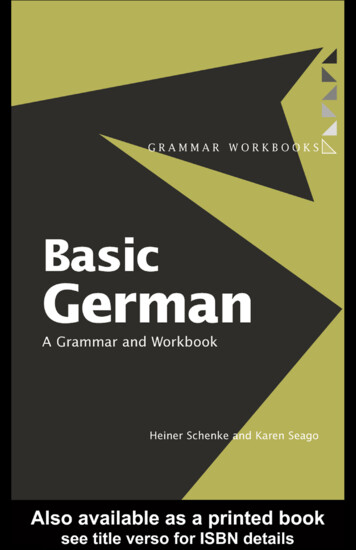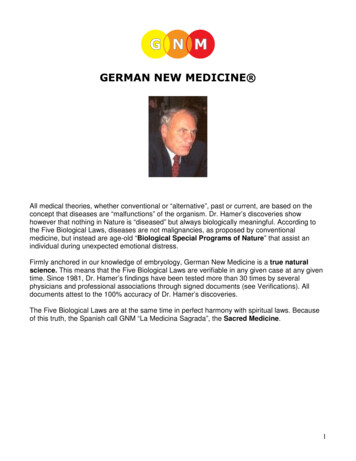
Transcription
UNIVERSITY OF OXFORDFACULTY OFMEDIEVAL AND MODERN LANGUAGESGERMANLanguage GuideFor thePRELIMINARY COURSEMichaelmas Term
German Language Guidefor the Preliminary Course in GermanCONTENTS(Page No.)1.The Language Course4.Study Skills5.Grammar Topics: guide to the grammar classes11.Grammar checklist: common sources of error13.Vocabulary: sharpen up your learning strategies15.German Essay: phrases to help you present yourpoints24.Pronunciation: how to sound German27.Deutsche Gesellschaft und Kultur seit 1890 Genarationen und Geschlechter (Aus-)Bildung wozu? Arbeit zwischen Selbstverwirklichung undEmfremdung Nation und Nationalismus56.Paper 1: Sample paper (TT08)1
The Language CourseThe first year of the German course is designed to consolidate and improve your languageskills while exploring issues related to twentieth-century German society and culture anddeveloping an appreciation of German language and literature. The syllabus is set out in theHandbook for the Preliminary Course in German, The course will prepare you for thePreliminary Examination, taken at the end of your first year. It consists of two parts that carryequal weight: Language (Paper I and Paper II) and Literature (Paper III and Paper IV). Inorder to pass Prelims, you need to pass both parts. Within each part, papers can compensateeach other, e.g. if you pass Paper I and fail Paper II, it is still possible to pass the Languagepart if the marks overall are above the pass mark of 40 (see the "Descriptors for Prelims" inyour Handbook, which set out the scale of marks and the criteria used for assessment).Language teaching is provided partly by your college and partly by the Sub-faculty ofGerman. Much of the teaching takes place in small classes, and you will have close personalcontact with your tutors - this is luxury provision, and you should make good use of it! It willonly benefit your language competence if you put in the necessary work independently outsideclasses - only you can do the learning. This Guide is intended to give you advice on how youcan make the most of your abilities and the opportunities provided by your course.The Examination Papers in German Language:Paper I: Deutsche Gesellschaft und Kultur seit 1890 (see sample paper at the end of thisbooklet)The paper is based on four topics: Generationen und Geschlechter; (Aus-)Bildung - wozu?;Arbeit zwischen Selbstverwirklichung und Entfremdung; Nation und Nationalismus. The twoexercises are of equal weight.1) Reading Comprehension: You will be given a text of around 400-450 words. This ison a subject that relates to the four topics studied. Roughly equal credit will be given forevidence of detailed comprehension, and for linguistic accuracy and variety. Answers inEnglish will be discounted. You will be expected to answer three questions, aiming forthe following length: 1(a) approximately 150 words, 1(b) approximately 100-150 words,1(c) approximately 250 words.2) Essay: You will be given approximately six questions that relate to the four topicsstudied, from which you choose one. You should aim for a length of 500-600 words.Roughly equal credit will be given for linguistic accuracy and variety, and for initiative,ability to take up and express complex ideas, and the shape of the argument. The exerciseis not conceived as a test of detailed or specific knowledge.Paper II: Translation into German (IIA, 1½ hrs) and Translation from German (IIB, 1½hrs)In both exercises, credit will be given for fluency and a sense of style, always bearing in mindthe need for accuracy and appropriateness. The two exercises are of equal weight.1Revised TT2011
Language TeachingYou will follow an integrated programme of language teaching in which each part contributesto the whole. The first-year course is designed to focus on areas that will lay a securefoundation for the rest of your course and enable you to develop skills systematically beyondA-level competence. Emphasis will be placed on the development and precise use ofvocabulary and grammar. Teaching is provided by a number of people: College Tutor: Your college tutor will oversee your programme of language teachingthroughout your course and will act as your 'personal coach' to ensure you have thenecessary support to make good progress. Classes for translation from and intoGerman (Paper II) will be organised by your college tutor, who will also liaise closelywith your Lektor about preparation for Paper I. If you have problems with yourlanguage learning, or need general advice, you should turn to your college tutor in thefirst instance.Lektor: Your college is part of a consortium of colleges that employs a Lektor, who isa native speaker of German. Across the colleges, there are five Lektors. They willparticipate in a centralised course providing lectures and seminars for DeutscheGesellschaft und Kultur in Michaelmas Term and you will also have college-organisedclasses with your Lektor to prepare you for the Paper I Reading Comprehension andEssay. Over the three years of your course at Oxford, your Lektor will fulfil animportant role in helping you develop your language skills.Language Instructor: The Language Instructor is employed by the Sub-faculty ofGerman and normally teaches at the Language Centre in 12 Woodstock Road. TheLanguage Instructor, together with a colleague, provides weekly grammar classes.Heath Harrison Fellows: These are employed by the Sub-faculty and they will giveclasses to provide additional grammar practice to support the structured programmeprovided by the Language Instructor.Most of your language work will take place in classes: translation classes, grammar classes,classes designed to develop your essay-writing skills and discussion skills. You will be givenassignments for these, and it is important that you do these thoroughly and hand them in goodtime to enable your tutor to provide feedback.Deutsche Gesellschaft und Kultur seit 1890In Michaelmas Term, there will be a centralised course on the four topics for this course. Youwill have a lecture and a class on each topic: Generationen und Geschlechter (weeks 1 and 2) (Aus-)Bildung - wozu? (weeks 3 and 4) Arbeit zwischen Selbstverwirklichung und Entfremdung (weeks 5 and 6) Nation und Nationalismus (weeks 7 and 8)The lectures will give you exposure to German academic language in a lecture format, andintroduce the four topics, providing information while stimulating ideas. The classes enableyou to practise your oral skills and engage in discussion on the topics. The period covered inthis course with the starting date of 1890 is designed to link up with the literary texts you arestudying, and the topics are designed to relate to your texts. You should not therefore think ofthe topics in purely contemporary terms, but also develop a historical perspective and exploreas many links as you can with the literary texts. You will not be required to show detailed2Revised TT2011
knowledge of historical developments, but your literary texts can highlight key issues that arerelevant to these, and provide useful example material.In Hilary Term and Trinity Term, college classes will provide preparation for the ReadingComprehension exercise and Essay through written work.Use the resources of the Language Centre, Faculty Library, German Society.3Revised TT2011
Study Skills: balancing language learning and tutorial workLanguage learning and tutorial work each constitute half of your German course, and languagepapers carry the same weight as the tutorially taught papers both in the PreliminaryExamination and in Finals. This should be reflected in the way you plan your work. It doesn'tmean that you'll need to work for both aspects of the course in the same way - indeed you mayneed to develop quite different techniques and working patterns.Plan aheadLanguage work should carry the same weight as your work for tutorials, so you should makesure that you factor systematic language learning into your weekly time-table. As withtutorials, the contact hours in language classes are only the tip of the iceberg; they shouldprovide the focus for independent work and an opportunity for feedback that will only beuseful if you provide the necessary basis. So you will need to allow sufficient time to complete the pieces of language work set (3 hours per piece isa realistic estimate) set aside regular periods for systematic vocabulary learning and revision (15 minutesevery day is better than 2 hours once a week) allow time to go over the work covered in the language classes and consolidategrammarWork efficientlyYou will make most progress if you find efficient ways of practising and developing yourlanguage skills. This may mean experimenting with different patterns of work. It maytherefore be helpful to work out the time of the day when you are best able to remember vocabulary remember that language and literature work are interconnected: you can't understandlinguistics nuance unless you know about a culture, and you can't find out about aculture unless you are able to appreciate linguistic nuance. establish connections between the different parts of your course. You could, forexample, note down unusual phrases, verbal constructions and items of vocabularywhile reading a set text, and transfer them onto your own database or record cards, orlook for examples of grammatical constructions you have just revised in the literarytexts you are reading for your tutorial work make a note of useful phrases for essay writing when reading German criticism4Revised TT2011
GERMAN GRAMMAR FOR FIRST YEAR STUDENTSList of Topics for Michaelmas TermTOPICSw1:EXERCISESIN CLASSNOUNSchap.1:7, 11, 13, 14,22- Gender rules (1.1)- Plurals (1.2)- Noun declension (1.3)- Sgl.& pl.nouns (1.2.9 - 1.2.14)w2:NOUNS/CASES- Weak and strong nouns (1.3)- The four cases (2.1 - 2.5)- Apposition (2.6)w3:chap.1:2, 3, 4, 16,17chap.1:19chap.2:1, 2, 4, 7,12, 14ADJECTIVES- Weak and strong declension (6.1, 6.2)- Adjectives used as nouns (6.4)- Adjectives and cases (6.5)- Adjectives and prepositions (6.6)w4:EXERCISESIN COLLEGEPRONOUNS- Personal Pronouns (3.1, 3.4, 3,6)- Reflexive and reciprocal pronouns(3.2)- Prepositional adverbs (3.5)5chap.2:3, 6, 11, 1516chap.6:2, 4, 8, 13,14chap.6:1, 6, 9, 11revise: 13, 14chap.3:1, 2, 6chap.3:4, 5, 10chap.5:1, 3, 5, 7chap.5:2, 4Revised TT2011
- Demonstrative pronouns (5.1)- Interrogative pronouns (5.3)w5:OTHER DETERMINERSAND PRONOUNSchap.5:8, 10, 12, 15,17chap.5:9, 11, 13, 19chap.4:1-8chap.4:1 - 8 (revise)chap.21:11, 13, 14, 21chap.21:4, 12, 15, 16- Relative pronouns (5.4)- Possessives, 'einer', 'keiner'(5.2, 5.5.4, 5.5.16)w6:ARTICLES- Declension (4.1)- Use of the definite, indefiniteand zero article (4.2 - 4.9)w7:WORD ORDER- Clause structure and the positionof the verb (21.1)- Position of pronouns, adverbials andcomplements (21.3 – 21.6)- Position of accusative and dativepronoun and noun objects (21.4, 21.5)w8:END OF TERM TESTto be sent to and marked by individualcollegesNOTE:The numbers of the exercises for work in class refer to the content they deal withrather than the exercises in their entirety. This also applies to the topic lists for Hilary and TrinityTerms.6Revised TT2011
GERMAN GRAMMAR FOR FIRST YEAR STUDENTSList of Topics for Hilary Termw1:TOPICSEXERCISESIN CLASSEXERCISESIN COLLEGEWORD ORDERchap.21:7, 17, 19, 22chap.21:revise plus 18, 20,24chap.12:2, 3, 7, 10chap.12:1, 5, 8, 11chap.14:1, 11, 12, 13chap.14:2, 14, 16chap.13:1-10 (not 8)13, 14chap.13:8, 11, 12- Inversion after concessive clauses(21.2.1b, 21.2.1c and 19.6.2)- Position of nicht (21.7)- Word order in multiple subordinateclauses (21.1.1, 21.1.3, 21.9.1)w2:CONJUGATION AND TENSES- Weak and strong verbs(12.1, 12.2)- 'haben' or 'sein' in the perfect tense(12.3.2)- Use of the tenses (14.1 - 14.5)- Equivalents for the Englishprogressive tenses (14.6)w3:INFINITIVES- Infinitives with and without 'zu'(13.2, 13.3)- Prepositional adverbs withinfinitive clauses (13.2.4)- Infinitival nouns (13.4)7Revised TT2011
w4:PASSIVEchap.15:1-7, 10chap.15:1-7, 10(revision)chap.15:11, 12, 13, 16chap.15:14, 15- Passive with 'werden' (15.1)- Passive with 'sein' (15.2)- 'von' or 'durch' after passive (15.3)- Passive constructions withouta subject (15.1.3, 15.1.4)w5:PASSIVE/IMPERATIVE/PARTICIPLES- Alternative passive constructions(15.4)- Passive & imperative(12.2, 15.1, 16.2)- Uses of the present & pastparticiples (13.5, 13.6)- Equivalents of English ing-formconstructions (13.7)w6:chap.16:1, 2SUBJUNCTIVEchap.13:16, 17chap.13:18, hap.16:12-21(revision)- Forms of Konjunktiv I and II(12.5, 16.2)- Wenn-clauses (16.5)w7:SUBJUNCTIVE- Indirect speech (16.6)- Other uses of the subjunctive (16.7)w8:END OF TERM TESTto be sent to and marked by individual colleges8Revised TT2011
GERMAN GRAMMAR FOR FIRST YEAR STUDENTSList of Topics for Trinity Termw1:TOPICEXERCISESIN CLASSEXERCISESIN COLLEGEMODAL AUXILIARIESchap.17:1, 2, 5, 7, 10,11, 13, 14chap.17:3, 4, 6, 8, p.18:17-19 plusrevisionchap.19:1-7chap.19:1-7(revision)- General rules on form and syntax(17.1)- Modal verbs dürfen, können, mögen,müssen, sollen, wollen (17.2 - 17.7)w2:VALENCY- Sentence patterns (18.1)- Accusative, dative, genitive objects(2.2 - 2.5, 18.3 - 18.5)- Transitive and intransitive verbs(18.3.5)- Reflexive verbs (18.3.6, 18.4.3)- Impersonal verbs (18.2.4)w3:VALENCY- Objects and cases (18.3 - 18.5)- Prepositional objects (18.6)w4:CONJUNCTIONS- Coordinating conjunctions (19.1)- Subordinating conjunctions(19.2 - 19.7)9Revised TT2011
w5:PREPOSITIONS- Prepositions taking the accusative/dative/genitive (20.1, 20.2, 20.4)- Prepositions taking the accusativeor dative (20.3)- Equivalents for English 'to' (20.5)w6:ADVERBS & COMPARISONchap.20:1, 3, 5, 6, 8,9, 10, 11chap.20:4, 7, 12,13, 14chap.7:1, 4, 7chap.8:2, 3, 6chap.11:3chap.11:revise 3chap.8:1- 4chap.8:revise 1 - 4- Adverbs of place & direction(7
Pronunciation: how to sound German 27. Deutsche Gesellschaft und Kultur seit 1890 Genarationen und Geschlechter (Aus-)Bildung wozu? Arbeit zwischen Selbstverwirklichung und Emfremdung Nation und Nationalismus 56. Paper 1: Sample paper (TT08) 1 Revised TT2011 The Language Course The first year of the German course is designed to consolidate and improve your



